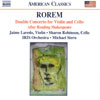Rorem Double Concerto. After Reading Shakespeare
Perfect performances? Who’s to argue with the composer in this lovely music?
View record and artist detailsRecord and Artist Details
Composer or Director: Ned Rorem
Genre:
Orchestral
Label: American Classics
Magazine Review Date: 4/2007
Media Format: CD or Download
Media Runtime: 54
Mastering:
Stereo
DDD
Catalogue Number: 8 559316

Tracks:
| Composition | Artist Credit |
|---|---|
| Concerto for Violin, Cello and Orchestra |
Ned Rorem, Composer
IRIS Chamber Orchestra Jaime Laredo, Violin Michael Stern, Conductor Ned Rorem, Composer Sharon Robinson, Cello |
| After reading Shakepeare |
Ned Rorem, Composer
Ned Rorem, Composer Sharon Robinson, Cello |
Author: Peter Dickinson
Ned Rorem has known these soloists for many years. He tells us in the CD booklet that these are perfect performances and it’s easy to accept his judgement. The Double Concerto seems to be full of chorales; the first section, “Morning”, is in a harmonic idiom close to Messiaen. The Mazurka never feels Polish and breaks out into a hedonistic waltz; “Looking” alternates between the solo violin and the brass group; and “Conversation at Midnight”, lasting nearly 15 minutes, is by far the longest movement. It is a series of luxuriant exchanges between the soloists and what starts as a kind of D major hymn in the strings, and it has its own central section with faster music. The last movement, “Flight”, blows everything away in just over a minute. All beautifully played.
Twenty minutes of solo cello music is not always the most inviting prospect, but played with this kind of panache there’s plenty to enjoy. It was an original idea to name the nine movements after characters in Shakespeare’s plays, but surprising that the titles were added either after or during composition – so they aren’t portraits. Lear gets two movements – the first more agonised, the second tranquil, perhaps reflecting his eventual reconciliation. Caliban is treated far more charmingly than he deserves. Finally there’s some conflict, as might be expected, when Iago shares a movement with Othello, but it evaporates into an ascending glissando. If some of this seems a little bland, don’t despair – just look out for Rorem’s memoir, Facing the Night: A Diary 1999-2005 (Shoemaker & Hoard: 2006).
Twenty minutes of solo cello music is not always the most inviting prospect, but played with this kind of panache there’s plenty to enjoy. It was an original idea to name the nine movements after characters in Shakespeare’s plays, but surprising that the titles were added either after or during composition – so they aren’t portraits. Lear gets two movements – the first more agonised, the second tranquil, perhaps reflecting his eventual reconciliation. Caliban is treated far more charmingly than he deserves. Finally there’s some conflict, as might be expected, when Iago shares a movement with Othello, but it evaporates into an ascending glissando. If some of this seems a little bland, don’t despair – just look out for Rorem’s memoir, Facing the Night: A Diary 1999-2005 (Shoemaker & Hoard: 2006).
Discover the world's largest classical music catalogue with Presto Music.

Gramophone Digital Club
- Digital Edition
- Digital Archive
- Reviews Database
- Full website access
From £8.75 / month
Subscribe
Gramophone Full Club
- Print Edition
- Digital Edition
- Digital Archive
- Reviews Database
- Full website access
From £11.00 / month
Subscribe
If you are a library, university or other organisation that would be interested in an institutional subscription to Gramophone please click here for further information.




